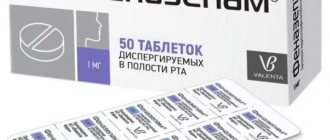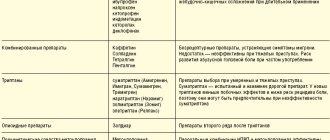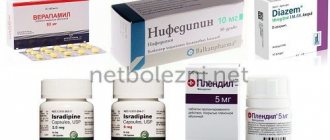Path: Home page › Vitamins and minerals › Vitamins for children's memory
A healthy life without vitamins is impossible, it’s not for nothing that even the name of these organic compounds comes from the word “vita”, which means “life”! The adult body reacts to a lack of vitamins with ailments, and subsequently with diseases of varying severity. For children, such a deficiency threatens not only illnesses, but also stunted growth, physical development, and impaired brain activity. Increased fatigue, inability to assimilate educational material, memory problems, inability to concentrate - these symptoms are familiar to many children today, and their cause may be vitamin deficiency.
As a rule, memory impairment in a child is accompanied by an inability to concentrate, problems with maintaining attention, and restlessness. It is difficult for such children not only to study, but also to participate in games. That is why it is important to provide the body with a sufficient amount of children's vitamins for memory much earlier than school life begins.
When is it necessary to take vitamins?
Until the age of three, a child absorbs information from the world around him like a sponge. At this time, it is important to pay attention not only to classes, creating a developmental environment and memory training. The child must receive all the substances necessary for the formation of a healthy brain and nervous system. A balanced and nutritious diet can prevent acute vitamin deficiency. However, a lack of some elements is still possible.
Vitamins for memory and brain development can be obtained from food, the main thing is that the diet is balanced
Deficiency leads to deteriorating memory, problems with learning and reduced immunity. Therefore, twice a year, in spring and autumn, some pediatricians advise taking vitamins for the development of brain activity for children. But there are other situations in which these drugs are indicated:
- If the examination reveals a deficiency of an element. As a rule, in this case, the doctor prescribes one or two medications to fill the deficiency of the substance.
- In conditions of increased mental activity, for example, during exams or preparation for a session, when strong memory and attention are especially needed. Children's vitamins have a gentle effect on the child's body, increasing its concentration.
- An unbalanced diet that is not able to provide all the necessary microelements.
How much does it cost?
“It’s good when it is possible to provide a child with adequate nutrition and support his body with vitamin preparations of the required effect,” most parents believe. But this benefit is not free. Are the prices of vitamins for schoolchildren too high? Let's try to figure it out. Indeed, the price range is wide. For example, “Kaltsinova” can be purchased for 200 rubles. But “Supradin-kids” will cost 600 rubles. “Alphabet” for schoolchildren costs 300 rubles. About the same for teenagers.
Omega Intellect is 40 rubles more expensive. Children's favorite gummy bears are not cheap - about 500 rubles. American chewable tablets for high school students have a similar price. Vitamins produced in Denmark are somewhat cheaper. This means that domestic drugs for schoolchildren are the most accessible to Russians, and perhaps the most useful.What vitamins do children need for their mind and memory?
There are many microelements, and they all play their role in the human body. For example, B vitamins are responsible for the functioning of the brain and nervous system. For the human body, they are necessary for:
- normal course of metabolic processes;
- amino acid synthesis;
- improving intestinal function and skin condition;
- heart function;
- biosynthesis of neurotransmitters;
- reducing stress.
A group B nutrient is not a single compound, but several substances containing a nitrogen molecule. This group includes:
- B1 – thiamine;
- B2 – riboflavin;
- B3 – nicotinic acid;
- B9 – folic acid;
- B5 – pantothenic acid;
- B6 – pyridoxine;
- B12 – cyanocobalamin.
But the above elements are not enough for the full functioning of the brain. Vitamin C is no less important for children; it helps thiamine and folic acid to be absorbed. It protects the brain from oxidative stress and prevents tissue degeneration, so it is even recommended for patients with Alzheimer's disease.
Without vitamin C, the absorption of iron deteriorates, on which the full development of memory and thinking directly depends.
Human intelligence is also influenced by the fat-soluble element A, which protects brain cells from stress and negative factors. It has been proven that its deficiency negatively affects the development of children and can lead to problems with memory and attention. Another vital element is calcium. It is involved in many metabolic and other processes of the body, and therefore, with its deficiency, cognitive functions are significantly reduced.
Foods rich in vitamins for the brain and memory
To prevent vitamin deficiency and develop memory in children, it is important to create a balanced menu. Products that improve memory and brain function have long been known:
- red fatty fish (salmon, salmon);
- nuts;
- cocoa and dark chocolate;
- coffee;
- melon;
- eggs.
- broccoli;
- olive and linseed oil;
- avocado.
We recommend reading: Useful properties and contraindications of avocados
Brain function and memory are improved by foods containing B vitamins, unsaturated fatty acids or Omega-3. Unfortunately, usually fish and fresh fruits and vegetables are not cheap, so they do not appear in the diet as often as they should. And not all nutrients obtained from food are absorbed. For example, in order to compensate for vitamin E deficiency, you need to eat at least a kilogram of walnuts.
The best vitamins for children for memory development
Choosing vitamins for brain development and memory for children is a difficult matter. Irresponsible manufacturers often add dyes and flavors that can cause allergies in children. Considering that now every second person is susceptible to this disease, you need to choose especially carefully.
Pikovit
"Pikovit" is one of the most affordable dietary supplements in the pharmacy. It contains the following substances:
- zinc;
- iodine;
- selenium;
- thiamine;
- vitamin D;
- vitamin B6;
- vitamin B12;
- ascorbic acid;
- vitamin PP.
In addition to the active ingredients, Pikovit also contains tangerine flavor, magnesium stearate, polysorbate and aspartame.
Multi-tabs Junior
Another budget vitamin complex that is suitable for children from four to eleven years old. The composition of this drug is impressive: Multi-Tabs contains 11 vitamins, including A, E, D and B, and 7 minerals. Chewable tablets are available in several flavors, so children enjoy drinking them.
Alphabet Schoolboy
As you can guess from the name, this complex is intended for children from 7 to 14 years old. One package contains 60 tablets, which are enough for a month; this is the course that is considered optimal.
Nutrients in the product do not interfere with each other’s digestibility. For example, complex No. 1 contains vitamins C, B1, A and iron and copper. And complex No. 2 contains vitamins C, E, B2, B6, A and magnesium with zinc.
Vita Bears
Perhaps the most favorite supplement among children. They produce vitamins in the form of gummy bears, and kids eat them with great pleasure. The composition includes all the substances necessary for brain function. Children from 3 years old can take Vita Bears. These are good brain development vitamins for children that have virtually no side effects.
Vitrum junior plus
has long established itself as a reliable manufacturer. The complex for children includes the following elements:
- vitamin C;
- vitamin A;
- vitamin D;
- all B vitamins;
- vitamin K1;
- biotin;
- iodine;
- iron;
- potassium.
What distinguishes it from others is the presence of vitamin K1 in its composition. The drug can be taken by children from 7 years of age.
Helping a first grader
Entering school is an important stage in a person’s life. The daily routine, being in the fresh air, and nutrition are changing. Movement and games fade into the background. A static position at a desk (sometimes for 4-5 hours) is, alas, the norm. How to get out of this difficult situation while maintaining your health?
Vitamins for schoolchildren 7 years old are a wonderful help for parents of first-graders. It is worth paying attention to the VitaMishki complex. These chewable lozenges can be given to children as young as three years old. Kids really like colorful jelly bears! And they are especially useful for a first grader.
Lozenges have several varieties: Immuno, Multi, Calcium, Bio, Focus Plus. The names speak for themselves. The drugs will be useful if the child has poor appetite, reduced mental performance, has difficulties communicating with peers, with increased sports loads, and in many other cases.
Vitamins for the skin - a review of the best vitamins, vitamin complexes and reviews from cosmetologists (85 photos)Vitamins for diabetics - tips on choosing and taking vitamins. Prices, features of choosing a manufacturer and a vitamin complex (110 photos)
- Vitamins with hyaluronic acid - use with collagen, rules of use and purpose (125 photos)
How to choose the right vitamin complex
Finding the right vitamins for children to improve memory and attention can be difficult. When choosing, the following details are important:
- Compound. Multivitamin complexes are suitable for prevention. But if there are already problems, then it is better to give preference to mono-drugs.
- Age group. It is difficult to find something suitable in a pharmacy for children under 3 years of age. But for 3-4 year olds there are many more options. Before purchasing, you need to make sure that the selected complex is suitable for the child.
- Digestibility. The right combination of microelements is no less important than other factors. For example, vitamin C is best taken with vitamin E. But in combination with B1 and B12, it is practically not absorbed.
- An overdose of microelements is much more dangerous than their deficiency. The content of nutrients in the preparation should not exceed daily norms. In addition, do not forget about the substances that enter the body with food.
Vitamins are involved in many metabolic processes; if they are deficient, academic performance and memory may deteriorate
What do parents need to know first?
Usually, as soon as a child enters 1st grade, memory problems begin. But you don’t need to immediately start worrying and think that his laziness or poor memory abilities are progressing. We first need to understand the reasons. Sometimes, to solve this problem, it is enough to train your memory with the help of special games, and sometimes, start taking vitamins for children for memory.
Why do children's memory and attention deteriorate?
- There were birth injuries and difficulties during pregnancy
- The child is very overloaded with activities at school, clubs, sections
- Head injuries
- Lack of memory training
- Delays in speech development
- The child lacks vitamins and microelements. Incorrect diet and regimen
How to take vitamins
Synthetic vitamins are absorbed worse than those found in food. Therefore, they must be taken according to a certain scheme. Vitamins for a child’s mental development are best given in the morning, as they increase the activity of the nervous system. If you mix up the time and take them in the evening, you may experience insomnia.
Also, you should not take several vitamin complexes at the same time, as this can lead to an overdose. When using Pikovit or Vita Mishek, urine may turn yellow. This is due to the presence of vitamin B2 in the composition and is not considered an alarming symptom.
Since most drugs contain vitamin C, they are not recommended to be taken simultaneously with streptocide. Ascorbic acid enhances its side effects.
With caution, you need to combine nutrients with tetracycline, which is the main active substance in drugs such as Tigocil and Minolexin.
"Magic" pills
In the manufacture of this drug, the latest technology for separating components is used. In this case, unwanted interaction becomes impossible, since incompatible substances are contained in different tablets: red, yellow and white. Red contains vitamins B1, C, A, iron, copper, folic acid.
It is recommended to take this tablet with breakfast. In the daytime - vitamins E, B2, magnesium, zinc. It would be a good idea to remind your child to drink it at lunch. The white (evening) tablet includes vitamins B12, D, calcium, chromium.
Thus, the tablets become completely safe for schoolchildren, and they do not contain synthetic dyes. Well, what if your student mixed up the color scheme and started the day with a white tablet? Nothing bad will happen. Let him drink red during the day.
Contraindications
Dietary supplements are not always useful; in some cases they can cause serious harm. To avoid deterioration in health, before taking medications, you must consult a doctor and undergo all necessary tests.
The main contraindication is an excess of trace elements in the blood. Overdose can cause headaches, cramps, nausea and kidney stones. Another reason not to take supplements is an allergy or hypersensitivity to one of the components of the drug. You should also take vitamins carefully if your child is diagnosed with thyroid disease.
Good habit
Both character traits and habits are formed in a child in childhood. Reading books, playing sports, the ability to make friends, love of work, respect for elders - these and many other valuable skills and qualities come from childhood. Regular intake of vitamins should also be considered a useful habit. After all, taking care of one’s own health is a sign of human culture. No wonder people say: “A healthy mind in a healthy body.”
Komarovsky's opinion
Parents are constantly worried about the health of their children. They buy dietary supplements with only good intentions, but sometimes instead of boosting immunity they end up with a rash or hyperexcitability.
Dr. Komarovsky is of the opinion that not everyone needs vitamins that improve a child’s memory. At the same time, he does not deny the importance of microelements, but emphasizes that children can receive supplements only on the recommendation of a doctor and only in case of symptoms of their deficiency. This means that you should not run to the pharmacy just like that. But if the child has become lethargic, distracted and sad, then you should contact a specialist and listen to his advice.
Komarovsky recommends avoiding prophylactic use. In his opinion, this will not bring the same results as a usually varied and balanced menu. Instead of vitamins for the development of brain activity, it is better for parents not to give their children the same foods for a long time and introduce more vegetables and fruits into the diet.
Before taking medications, consult a doctor







